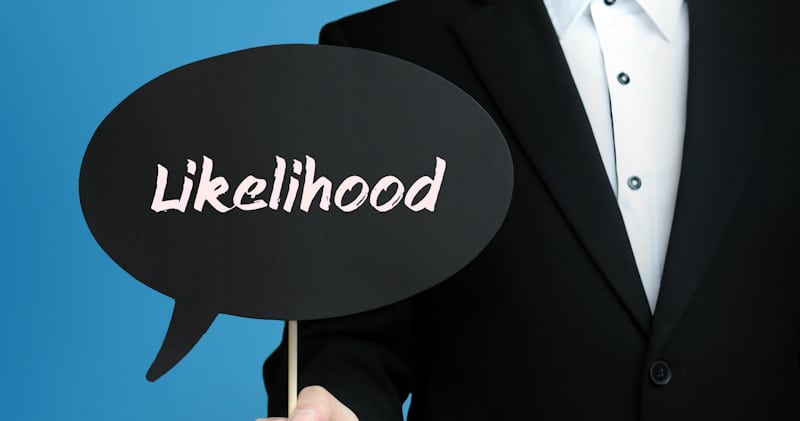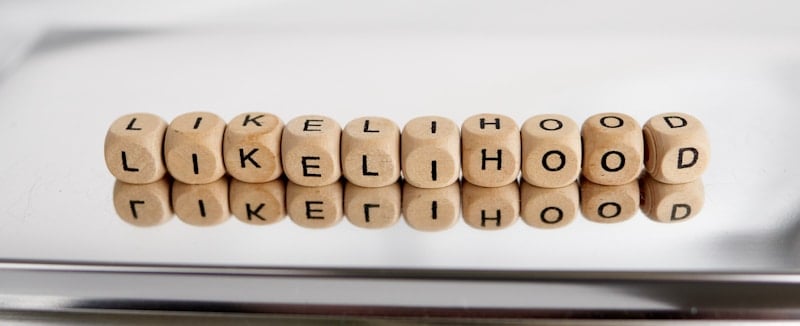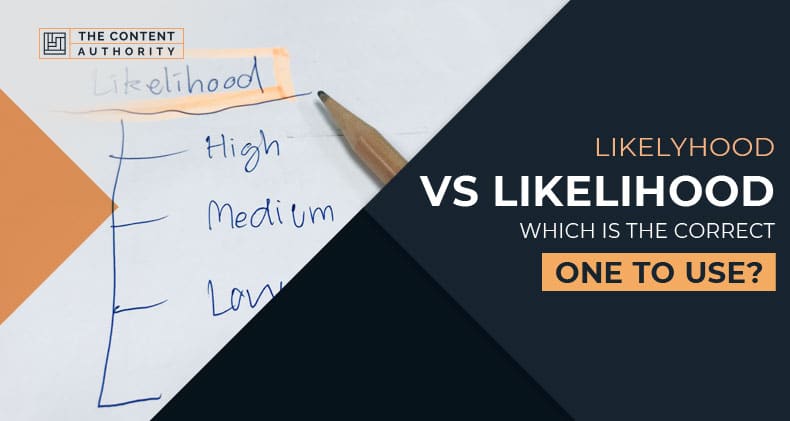Likelyhood or likelihood, Which is the correct word? It may seem like a straightforward question, but we may find ourselves unsure of the correct answer when it comes down to the nitty-gritty. Well, it is simple, likelihood is the only way to go.
“Likelyhood” is an incorrect way to spell “likelihood.” Even though it may come across as a bit odd, there is no known registry of the word “likelyhood” in any English dictionary. “Likelihood” is the correct way to spell this word.
The answer is quite simple, likely ends with a “y,” and given that, when we add a suffix like “hood,” we need to change the letter “y” to “I” to have it act in accordance with the grammar rules that are set in place. Most words ending in “y” need to have the “y” changed to “I” before evolving into a new term. The same also happens when converting, for example, lonely to loneliness, happy to happiness, or even ready to readiness.

Definition
According to the Merriam-Webster Dictionary, the word likelihood means “a chance that something will happen.” In other words, “likelihood” is the almost sure possibility that something is going to happen. Let’s say, for instance, that gray rain clouds cover the sky, and the forecast advises that there is a 95% chance of rain that day. This case would be a situation in which the word “likelihood” would be perfectly placed in a sentence that gives assurance of rain that day.
Synonyms
- liability
- probability
- plausibility
- Possibility
- Prospect
- Odds
- Chance
- Likeliness
- definitely
Antonyms
- unlikelihood
- unlikeliness
- improbability
- Impracticability
- Dubiety
- Uncertainty
- Unpredictability
- Impossibility
Related words
- Prospect
- Opportunity
- Potential
- Risk
- Viability
- Strong possibility
- Good chance
- Conceivability
- Hope
- Presumption
- For sure
Grammar Structure
The word “likelihood” is a noun. Its structure is composed of the root word “likely” and the suffix “hood.” When adding these together to form “likelihood,” we have to modify the root word and replace the final letter “y” with the letter “I” to make way for the proper use of the suffix.
The reason behind replacing Y with I is straightforward: the letter Y is also known as a semivowel. A semivowel is a letter that can behave as either a consonant or a vowel. Whether it acts as a vowel or consonant will depend on its position and functionality within a word. Almost every time we find a “Y” at the end of a term, Y is treated as a vowel because it makes a vowel sound.
However, when a suffix needs to be added, the Y isn’t always easy to pronounce; it doesn’t function well with the other letters in the attached suffix. This dilemma happens with both consonant and vowel suffixes.
Although this is a general rule, almost all grammar rules have their exceptions. Lets name a few:
- Exception 1: we never change Y to I when this suffix follows it. To maintain the meaning of a word ending with “-ing,” we need to keep the syllable with the Y. We shouldn’t have a word that ends in IING. If we simply exchange Y with “-ing,” the meaning of the word will change (or seem to change). Example: apply, applying, envy, envying, marry, marrying, pity, pitying.
- Exception 2: For some single-syllable adjective words like shy, sly, spry, and wry, it is better to conserve the Y when a suffix is added to make them into nouns, adverbs, or adjectives ( either in comparative or superlative forms). The words could be spelled with an I; this is usually seen as an acceptable variant. Note, however, that with the suffix “-ness” (and in some cases “-ly”), Y is permanently kept. For example shy, shyer, shyest, sly, slyer, slyest, spry, spryer, spryest.
- Exception 3: When Y comes after another vowel at the end of a word, we do not change it to an I no matter what type of suffix is attached to it. For example: buy, buyable, annoy, annoyable.
Etymology
The word “likelihood” first appeared in the 14th century from the words likely and hood. The term has had no known modifications, nor has it evolved in any way that can be observed. Its original meaning was also as it is now: high probability of something occurring.

Examples:
- The likelihood that tomorrow will rain is exceptionally high, given that there is a hurricane forecast all this week.
- In all likelihood, I should arrive in Spain by Tuesday morning, then France the following week.
- What do you think is the likelihood that dinner will be on time tonight?
- We all agree the likelihood is less given the astonishing circumstances, but still possible.
- Having had the illness shouldn’t affect the likelihood of you getting the job; after all, the test reveals that you’re not infectious.
- This latest dispute between bosses and union leaders dramatically increases the likelihood of a union strike.
- We must do everything in our power to reduce the likelihood of war between North and South Korea.
- Always using a seatbelt will reduce the likelihood of serious injury in a car accident, especially when driving with infants.
- The likelihood of infection is minimal because we tended to your wounds very quickly.
- In all likelihood, the meeting will be canceled given today’s dramatic events.
- Is there any likelihood of getting our money back after that hurricane hit the island?
- If I refused to take that company retreat, it would, in all likelihood, mean I’d lose my job.
- In all likelihood, he’ll be able to play the final tournament on Saturday.
- The likelihood is that sales figures will continue declining once the curfew is lifted and businesses regain their momentum.
- In all likelihood, the police will have to interview every woman who’s worked with Fred over the last ten years.
- They must face the likelihood that the company might go bankrupt if new procedures aren’t placed immediately.
- Engaging in regular exercise reduces the likelihood of a heart attack, especially in people over the age of 40.
- There’s a strong likelihood of finding the missing child within the next few hours because police caught a good lead.
- As you get older, the likelihood of catching an illness increases unless you lead an exemplary lifestyle and take excellent care of your health.
- There is very little likelihood of him being acquitted because he confessed to the crime as soon as he was arrested.
More Word Comparison Posts
People also ask:
-What does “In all likelihood” mean?
“In all likelihood is a phrase, also meaning something will most probably happen.
-What is a synonym phrase I can use instead of “In all likelihood”?
Another phrase that can replace “In all likelihood” is “In all certainty.”
-Is likelihood found in any formal structure?
The term “likelyhood” is a direct misspelling of likelihood. It should not be applied as it will become a spelling mistake.
Final Thoughts
Figuring out how to correctly spell a word may sometimes get the better of us. Still, we must never forget that to become more knowledgeable; we must seek and find the answers to our questions. Spelling words correctly may very well be one of the most important things a professional can do, for it projects an organized, well-read individual who is fully prepared to tackle any task that may come.
“Likelihood” and “likelyhood” are terms that we may very easily misspelled. We must never forget to go back to the basics when we feel we need to consult about a particular spelling of a word. There are numerous articles, professors, and librarians who are always willing to help clarify all doubts.
Shawn Manaher is the founder and CEO of The Content Authority. He’s one part content manager, one part writing ninja organizer, and two parts leader of top content creators. You don’t even want to know what he calls pancakes.

